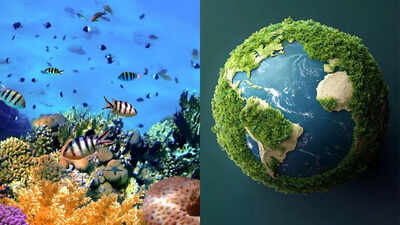ARTICLE AD BOX

The planet has reached its first catastrophic climate tipping point, with warm water coral reefs facing long-term decline, according to a new report. Scientists warn that unless global heating is reduced to 1.2°C as quickly as possible, these reefs will not survive on any meaningful scale, threatening the livelihoods of hundreds of millions of people who depend on them.
The report, compiled by 160 scientists from 23 countries, highlights that coral reefs are already experiencing widespread bleaching events and unprecedented stress. This moment signals the urgent need for immediate climate action to prevent further irreversible damage to one of the world’s most vital ecosystems.
Coral reefs pushed past the tipping point
Coral reefs are home to about a quarter of all marine species and are highly vulnerable to rising ocean temperatures.
Since January 2023, reefs have been experiencing the fourth and worst global bleaching event on record, affecting more than 80% of reefs across 80 countries. Scientists describe the current conditions as “uncharted territory,” with extreme heat, low diversity, and disease outbreaks pushing many reefs toward collapse, particularly in the Caribbean and other tropical regions.Tipping points occur when an ecosystem reaches a stage where severe degradation becomes inevitable.
The report estimates that coral reefs hit this threshold when global temperatures rise between 1°C and 1.5°C above pre-industrial levels, with a central estimate of 1.2°C. Current global heating is approximately 1.4°C, meaning reefs are already beyond the safe threshold. Without rapid greenhouse gas reductions, the upper limit of 1.5°C could be reached within the next decade.
Scientists call for urgent action
Prof Tim Lenton of the University of Exeter explains that this is no longer a future risk: widespread dieback of coral reefs is already underway.
Dr Mike Barrett, chief scientific adviser at WWF-UK, emphasises that conserving reefs is more critical than ever, with a focus on protecting refugia—areas where reefs remain resilient. Experts stress that local management improvements and global climate action are both vital to preserve these ecosystems and the communities that rely on them.
A cautiously hopeful outlook
While coral reefs are in serious decline, some scientists, including Prof Peter Mumby, note that certain reefs may survive and adapt even at 2°C of warming. The report also highlights “positive tipping points” in society, such as electric vehicle adoption, which could accelerate emissions reductions. Protecting remaining reefs and enabling recovery is essential to safeguard biodiversity and human livelihoods, making immediate, coordinated climate action a global priority.

 6 hours ago
4
6 hours ago
4









 English (US) ·
English (US) ·